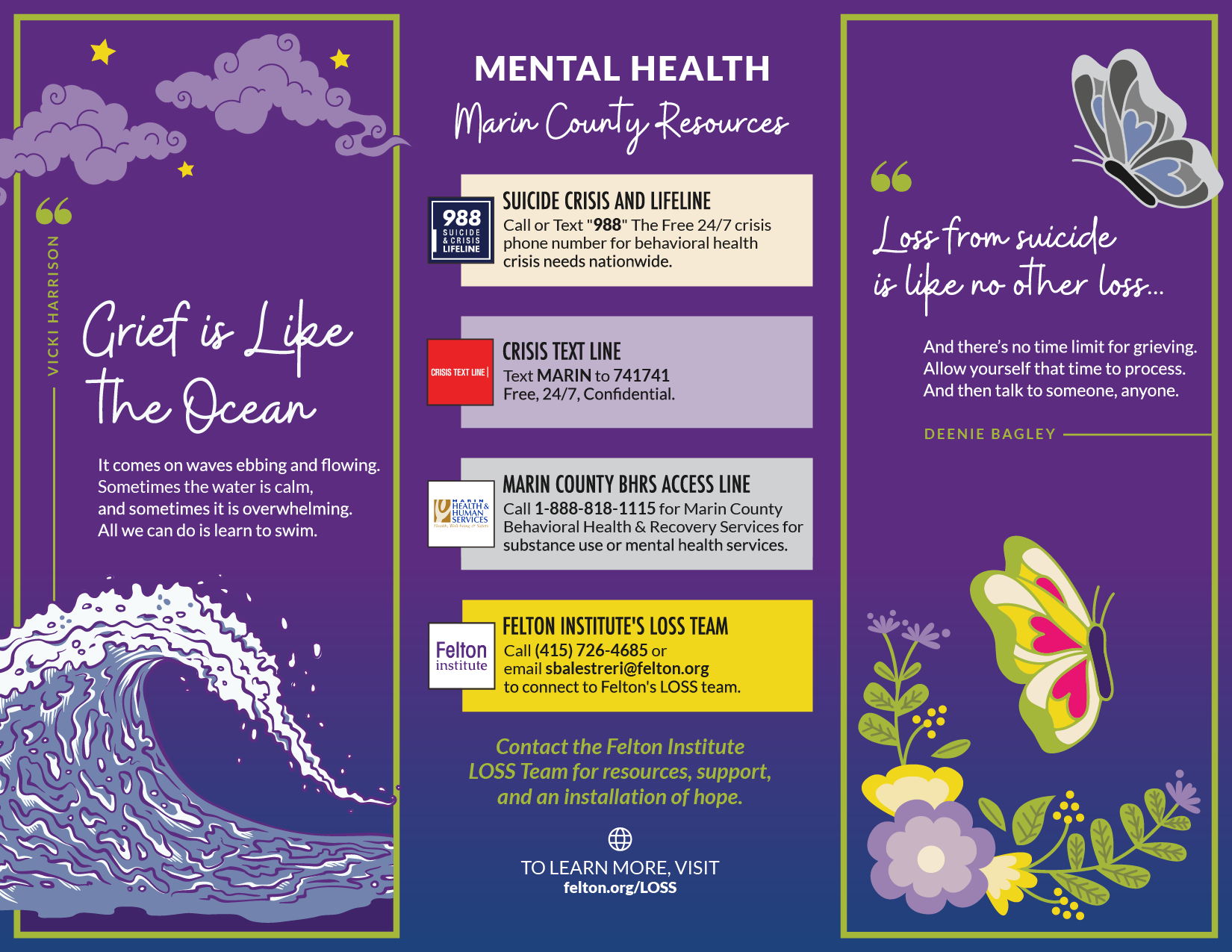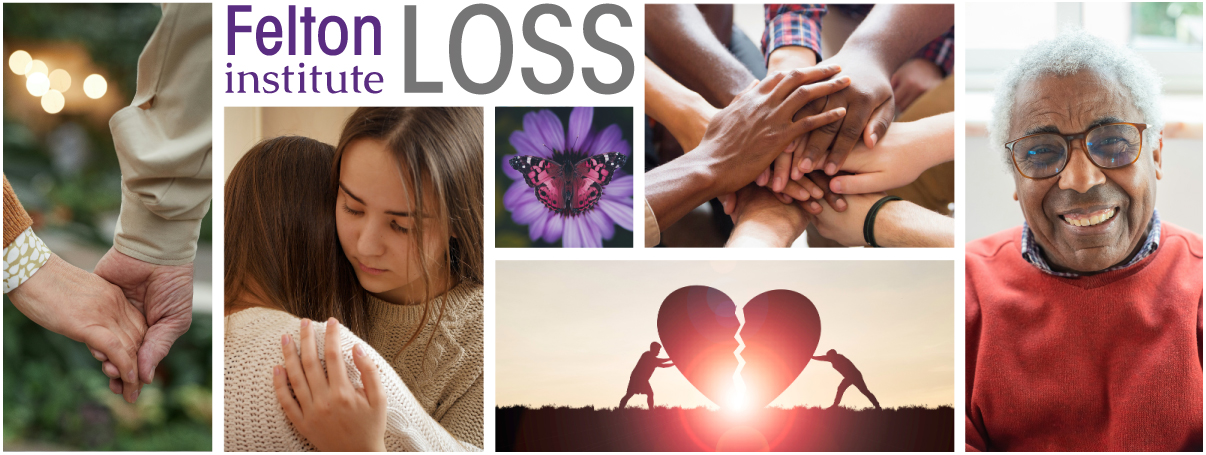
LOSS stands for Local Outreach to Suicide Survivors
LOSS provides a postvention support program in Marin County for those affected by suicide loss and survivors of suicide attempts. Our primary role is to connect survivors of suicide to resources and services that promote a sense of connection, community, and hope.
LOSS operates three peer support programs to serve survivors of suicide:
- Direct Outreach to Survivors of Suicide Loss (SOSL)
- Youth & Young Adult Survivors of Suicide Loss Support Group
- Adult Survivors of Suicide Attempt (SOSA) Support Group
- Support Services for family members/friends who’ve lost a loved one to suicide.
- Information on services, resources, and connection to suicide survivor support groups.
- Peer Support Groups that serve teens and young adults affected by a suicide loss as well as adult survivors of suicide attempts.
The LOSS team is primarily made up of survivors with lived experience and can serve as a guidepost for the newly bereaved or suicide attempt survivors in their process of grief and recovery.
LOSS is a vital and impactful postvention program working in coordination with our partners in Marin County’s Suicide Prevention Collaborative and a key part of the framework for Marin County’s Suicide Prevention Strategic plan.
The LOSS team receives notifications from Marin County’s Sheriff’s Department or designated law enforcement personnel to support those who have experienced a loss due to suicide affected by a suicide loss. Within 48 hours, our team brings resources, services, and a connection to other survivors of suicide loss, offering an installation of hope.
An individual can make a direct referral to the LOSS team if they have been impacted by a suicide loss or if they are the representative of someone newly bereaved by a suicide loss. To join one of our Peer Support groups please reach out directly to the LOSS program coordinator or fill out one of our intake forms.
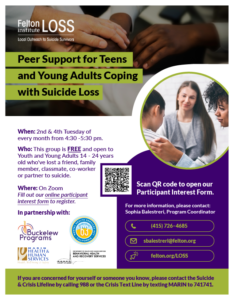 Youth and Young Adult Survivors of Suicide Loss (ages 14 – 24):
Youth and Young Adult Survivors of Suicide Loss (ages 14 – 24):
Support group facilitated by adult peers for those who have been impacted by a loss due to suicide. To learn more about our peer support group for youth and young adults, please download our flyer and fill out our online participant interest form.
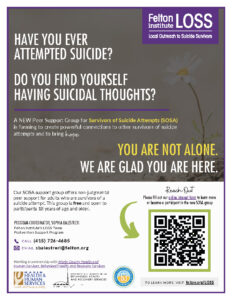 Adult Survivors of Suicide Attempts (SOSA):
Adult Survivors of Suicide Attempts (SOSA):
An eight-week peer support program for anyone 18 years or older who has made a suicide attempt. To learn more about SOSA, please download our flyer and fill out our online participant interest form.
PEER SUPPORT:
Are you…
A teen or young adult impacted by a suicide loss and looking for a support group?
VOLUNTEERING:
Are you…
A survivor of suicide loss or suicide attempt or a mental health professional interested in volunteering for the LOSS team?
PEER SUPPORT:
Are you…
A suicide attempt survivor and looking for a support group?
How You Can Become a Volunteer
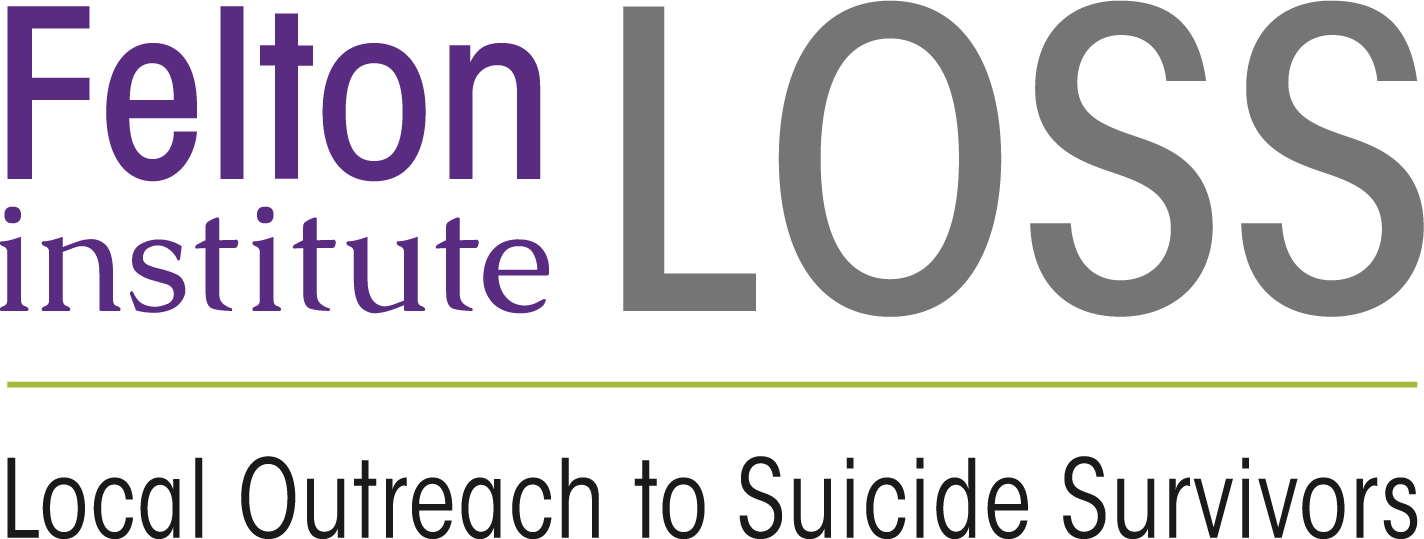
Have you lost someone to suicide? Your experience may help others.
Suicide is a painful, emotional, and stigmatizing health crisis. A LOSS Team is composed of individuals who have endured the challenges of losing a person to suicide. Members of the LOSS Team are available to provide postvention support and resources to the newly bereaved after a sudden loss to suicide.
Volunteer Requirements Eligible volunteers will complete an interview with the Program Coordinator, provide references, and complete a background check.
Requirements include:
- Be a suicide loss survivor and far enough along in your own journey that you are now able to help others (generally, no less than 2 years from your own loss).
- Be empathetic and compassionate.
- Or be a professional clinician with specific training in suicide loss and complicated grief.
- Be punctual, reliable, and respond to requests in a timely manner.
- Ages 21+.
- People of all personal and professional backgrounds are encouraged to apply.
Training: For direct outreach to survivors of suicide loss volunteers must complete approximately 8 hours of training by reading, completing online modules, and being available for in-person instruction.
Time Commitment: When training is completed, our volunteers dedicate a minimum of 4 hours per month to our program.
- Survivor to Survivor visits are scheduled on a case-by-case basis, and can take place during weeknight evenings and weekends.
- Volunteers sign up for shifts by calendar and list of activities. A minimum of 2 shifts per month is required.
- Participation in monthly team meetings for program updates and continuing education.
Contact: Sophia Balestreri, Program Coordinator at Sbalestreri@felton.org or call (415) 726-4685 to request an interview.
Downloadable Volunteer Brochure
To sign up for more information: https://feltoninstitute.salsalabs.org/lossvolunteer
LOSS Volunteer FAQ's
The LOSS Team Postvention Support Program in Marin County is providing essential resources and hope to the newly bereaved. Our team of trained volunteers are themselves survivors of a suicide loss or professional mental health providers.
Postvention services include providing support groups for Youth and Young Adults (14-24) who’ve been impacted by a suicide loss and Adult Survivors of Suicide Attempts (SOSA).
Volunteers are needed for:
- Direct outreach to the newly bereaved survivors of suicide loss.
- Co-facilitators for Support groups.
- LOSS program outreach at community events and administration.
How do I learn more about becoming a volunteer?
Attend a LOSS team information session occurring the 3rd Tuesday of each month by Zoom. Click here to register or contact the program coordinator (415) 726 – 4685 to learn more.
How does LOSS work?
- The LOSS team is notified by the Marin County Sheriff’s Coroner’s Office (MCSO) when a suicide has been confirmed.
- LOSS team members “on-call” are contacted by the program coordinator or team lead and endeavor to make initial contact to the newly bereaved within 24 – 48hrs.
- The LOSS team then works in pairs to deliver an Aftercare Guide to survivors to any location in Marin County.
- After initial contact is made and the Aftercare Guide delivered the LOSS team will follow up with survivors to see if additional resources are needed.
What are the Support Groups?
- Youth and Young Adult Survivors of Suicide Loss (ages 14 – 24)
- Adult (18 and older) Survivors of Suicide Attempts (SOSA)
Who facilitates these groups?
The groups are facilitated by a clinician who provides supervision, while trained volunteers with lived experience serve as co-facilitators. Volunteers can be professionals in suicide prevention and grief support, as well as adults who have personal experience with suicide attempts or suicide loss.
For the Youth and Young Adult Support Survivors of Suicide Loss Group.
Adult co-facilitators must complete 16 hours of training and be interested in supporting youth who have lost someone to suicide. Volunteer co-facilitators can have either professional experience in suicide prevention and grief support or they may have lived experience as a survivor of suicide loss. and Volunteers should be at least two years removed from their own loss and far enough along in their journey to support others.
For the Adult Survivors of Suicide Attempt Support Group.
Volunteer co-facilitators must either have lived experience as a suicide attempt survivor or professional experience in suicide prevention. Those with lived experience should be 2 years or more removed from their suicide attempt experience and must be far enough along on their own journey of recovery to support others in a structured group setting.
What are the requirements for LOSS Volunteers?
- For Support Groups – Be able to serve for at least 6 months after initial training.
- For direct outreach to survivors of suicide loss volunteers should be available to be “on-call” for 1-2 days per month.
- Be able to attend all debriefs and 90% of all team meetings.
- Be willing to complete a basic background check.
- Be willing to complete a 1-hour interview and Felton volunteer application.
What is the average time commitment for volunteers?
Average time includes meetings, ongoing trainings, and support (monthly meetings and debriefs).
- On average 6 – 10 hours per month (after *initial training)
*Initial training is approximately 8 – 20 hours either virtual or in-person. - Volunteer group co-facilitators (16 – 20 hours)
- LOSS team direct outreach to survivors (8 – 10 hours)
How do you train volunteers?
- Trainings are a combination of online modules and in-person. Monthly meetings provide additional support for direct outreach to survivors of suicide loss.
- For the NEW Support Groups Initial trainings have occurred and ongoing trainings will be provided for those interested in becoming co-facilitators.
- Please expect a combination of both online and in-person trainings for each program and continual learning as materials become available.
All Volunteers need to be sensitive, compassionate, and emotionally resilient.
CONTACT INFORMATION
Sophia Balestreri, LOSS Team Program Coordinator
LOSS Team Postvention Support Program
Phone (work cell): 415-726-4685
Email: sbalestreri@felton.org
To sign up for more information: https://feltoninstitute.salsalabs.org/lossvolunteer
In partnership with Marin County – Health and Human Services, Behavioral Health and Recovery Services.
